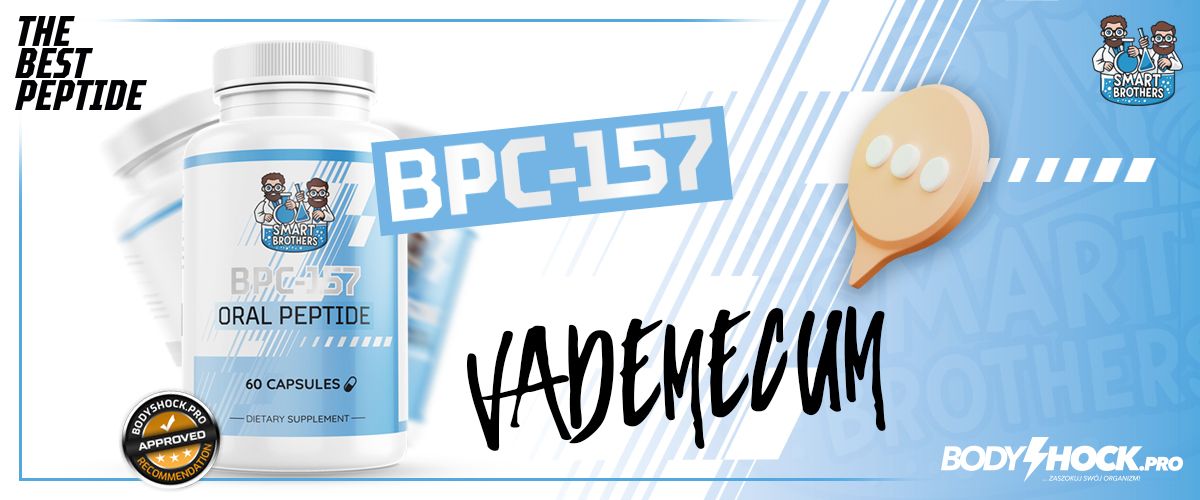What is BPC-157 ? - King of Peptides - Benefits, Dosage, and Side Effects

What is BPC-157 peptide and what does it help with?
Peptides are chemical compounds that are becoming more and more popular in the world of medicine and sports. One of the most famous peptides is BPC-157, a substance with a strong regenerative effect, which brings many benefits in supporting the process of healing injuries, restoring joint function, and more. In the article, we have collected all the necessary information so that you can find out what BPC-157 in capsules is, when to use the peptide and what exactly it helps with.
What are peptides?
Peptides are short chains of amino acids that are the building blocks of proteins. They act as signals in the body, influencing various biological processes. Peptides can have different lengths - from several to several dozen amino acids - and can perform various functions, such as regulating metabolic, hormonal and regenerative processes. These are active compounds that perform many specific functions in your body.
The role of peptides in the human body
Peptides play a key role in many biological processes. They can act as hormones, neurotransmitters, and even as growth factors. Due to their versatility, peptides are being investigated for potential therapeutic applications in various medical fields, including the treatment of autoimmune diseases, metabolic disorders and tissue damage.
What is BPC-157 peptide?
BPC-157, also known as Body Protection Compound 157, is a synthetic peptide that was developed based on a protective protein found in the human stomach. BPC-157 has gained attention from scientists and athletes due to its potential regenerative and anti-inflammatory properties.
BPC-157 was first identified in the 1990s. Research on this peptide has been conducted for over two decades, and the results suggest that BPC-157 may have broad applications in regenerative medicine. This peptide is particularly interesting due to its origin - it was created on the basis of a natural protein, which increases its biocompatibility and safety of use.
How does BPC-157 capsules work?
BPC-157 works by affecting various biological pathways in the body. The most important mechanisms of action of this peptide include:
Acceleration of tissue regeneration
One of the main uses of BPC-157 is its ability to accelerate tissue regeneration. Studies have shown that BPC-157 can support wound healing and the regeneration of muscles, tendons and ligaments. This peptide stimulates angiogenesis - the process of creating new blood vessels, which is crucial for delivering nutrients to damaged tissues.
Anti-inflammatory effect
BPC-157 also has anti-inflammatory properties. It may reduce the production of pro-inflammatory cytokines and increase the secretion of anti-inflammatory substances. This makes BPC-157 useful in the treatment of inflammatory conditions such as arthritis and inflammatory bowel diseases.
Supporting the digestive system
BPC-157 has a protective effect on the digestive system. It may support the regeneration of the gastric and intestinal mucosa, which is particularly important in the treatment of stomach ulcers and other digestive tract diseases. This peptide may also support the functioning of the intestinal barrier, which is important in the context of intestinal health and immunity. Moreover, it works perfectly as a protective element when using stronger supplementation such as SARMs or prohormones.
Applications of BPC-157
Treatment of sports injuries
BPC-157 is gaining popularity among athletes and physically active people due to its regenerative properties. It can be used to treat damage to muscles, tendons, ligaments and joints. Thanks to its fast regenerative effect, BPC-157 can shorten the recovery time and enable a faster return to physical activity.
Regenerative therapies
BPC-157 is also being investigated for applications in regenerative medicine. It can support the treatment of tissue damage, such as burns, post-traumatic wounds or damage to internal organs. Research suggests that BPC-157 may be effective in stimulating tissue regeneration even in difficult clinical cases.
Support in the treatment of pro-inflammatory diseases
Due to its anti-inflammatory properties, BPC-157 may be useful in the treatment of inflammatory diseases such as rheumatoid arthritis and inflammatory bowel diseases. This peptide may help reduce inflammation and alleviate the symptoms of these conditions.
How to dose BPC-157 capsules?
The peptide dose typically ranges from 250 mcg to as much as 1,000 mcg per day.
We use the peptide on an empty stomach, 30 minutes before the first meal. It is best to use 2-3 servings a day in smaller quantities.
The BPC-157 peptide perfectly complements its action with another TB-500 peptide. It is recommended to combine both peptides when fighting severe injuries.
BPC-157 peptide - what is worth remembering?
BPC-157 is a peptide with enormous healing and regenerative potential. His abilities
to accelerate tissue regeneration, anti-inflammatory effects and versatile applications make it increasingly popular both in medicine and among athletes. Correct dosage and use of BPC-157 can bring numerous health benefits that will improve the fight against injuries and speed up regeneration.
Check out the best peptides in capsules available in our store.
Scientific sources:
- Sikiric, P., et al. (2018). "The stable gastric pentadecapeptide BPC 157: novel therapy in gastro-intestinal tract." Current Pharmaceutical Design, 24(15), 157-165.
- Sehdev, A., et al. (2015). "BPC-157 and Inflammatory Bowel Disease." Journal of Clinical Gastroenterology, 49(6), 416-422.
- Chang, C. H., et al. (2017). "The effect of BPC 157 on muscle and tendon healing: A review of animal and human studies." Journal of Orthopaedic Research, 35(10), 2157-2163.
- Sikiric, P., et al. (2013). "Toxicity studies of BPC-157." Current Pharmaceutical Design, 19(1), 37-44.



















